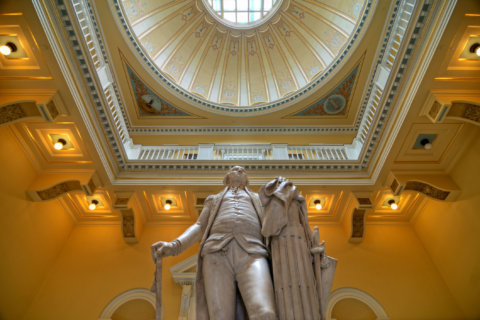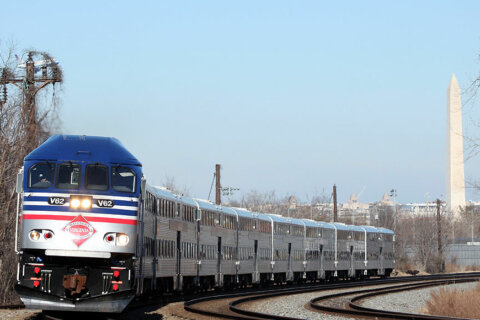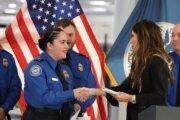A ban on holding your cellphone behind the wheel, changes in fines for reckless driving on the interstate, and changes to taxes and fees are among the transportation changes under consideration in Virginia’s General Assembly session that begins Wednesday.
The proposals are among bills filed ahead of the session that go beyond Gov. Ralph Northam’s budget proposal to end car inspections and raise the state’s gas tax.
A ban on handheld cellphone use while driving has nearly passed in the General Assembly in each of the last two years.
This year’s bills are similar to those that have passed in each chamber before. They would expand the current bans on texting or emailing while driving anywhere in Virginia and on handheld cellphone use in work zones by banning holding a cellphone while driving anywhere in the state starting in 2021. The ban on handheld cellphone use in work zones was adopted last year.
Another recurring bill proposed again this year would raise the speed that automatically triggers a reckless driving charge from 80 mph to 85 mph. Those who support the change say it would make things more fair for drivers on interstates with 70 mph speed limits. In the current law, going 11 mph over the speed limit carries a penalty of up to a year in jail and a $2,500 fine.
Lawmakers could also toughen penalties against drivers who hurt pedestrians by running a red light or failing to stop at a crosswalk. Currently, that is just a traffic infraction. One proposed bill would make that a Class 2 misdemeanor, if the person hit is killed or seriously injured.
In a similar vein, the General Assembly could expand the “move over” law — toughened last year as an effort to protect police and firefighters — to provide similarly toughened penalties for drivers who fail to slow down or move to another lane for tow-truck drivers and similar workers stopped on the side of the road.
Failing to wear a seat belt in the front seat of a car could become a primary offense for which police can pull a car over. Passengers in the back seat would also be required to buckle up for safety. Current law requires only the driver, people under 18 and anyone in the front seat to wear seat belts.
In a more long-term safety effort, Del. Paul Krizek, a Democrat representing Fairfax County, is also proposing getting seat belts on all new school buses in the state.
The state is also considering a study of statewide school bus driver shortages and a formal permission for Dominion Energy to roll out electric school buses that the power company would use in the middle of the day and overnight as power storage for the electric grid.
Another bill would raise the minimum age to use a motorized skateboard or scooter without adult supervision from 14 to 16 years old.
While long-term driver’s license suspensions over unpaid court fines and costs were effectively ended under legislation last year, there are a number of bills proposed to permanently prevent or otherwise change the practice.
Other legislative proposals would reduce or eliminate fees or interest added to some traffic or other violations. There are some additional bills that would increase some court or traffic fees to pay for changes, such as a new Virginia State Police electronic ticket system that is meant to speed up traffic stops and improve organization. The system would be funded by a $5 fee added to each state police citation, summons or arrest, similar to the charge local law enforcement agencies may charge.
Some more specific traffic proposals include limitations on road work on main roads any time between 6 a.m. and 6 p.m., changes to how road projects are selected for funding under state formulas, and permission for private investigators or bail bondsmen to have darker tinting on their car windows.
Lawmakers will also consider barring the Department of Motor Vehicles from re-examining any drivers flagged as potentially unable to drive a motor vehicle safely, but were subsequently cleared to continue driving, “unless the Department has good cause to believe that the driver’s condition has deteriorated.” Such a bill would prevent regular checkups by the agency, unless a new medical condition arises.
Neighbors concerned about cut-through traffic or trucks getting stuck could be interested in a proposal requiring commercial vehicles to use a special GPS program designed for trucks anytime they are on roads other than an interstate.
Local governments could also be permitted to require anyone who owns property within 5 feet of a street or other public right of way to cut down trees or tree limbs, mow grass or otherwise make changes to ensure a clear line of sight for drivers and prevent any interference with or collisions with cars.
In the construction world, some contracting proposals would allow new consideration of the best- value bids for construction projects, or put new limits on how long a contractor could be sued by the state for faulty work.
Another bill would allow the buyer and seller of a property in Northern Virginia to negotiate who pays a “grantor’s tax” on real estate transactions. The money helps fund Metro.
These bills are just some of those filed and posted so far, and others can still be introduced.
Bills are frequently significantly changed through amendments during the session, folded into other proposals, or completely rejected by the legislature.







